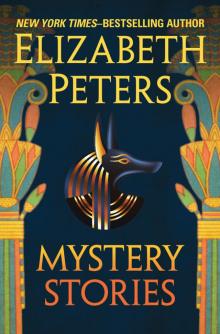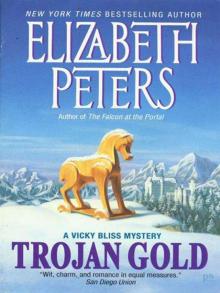- Home
- Elizabeth Peters
Trojan Gold vbm-4 Page 5
Trojan Gold vbm-4 Read online
Page 5
“Maybe some day,” I said soothingly.
For a moment I had feared he was really hurt by my excuses, but if so, he recovered quickly.
“Who is my rival?” he demanded in tragic accents. “Who is it I must kill to win your love?”
“It’s none of your business, actually,” I said. “But if you mean whom am I seeing next week—it’s Tony.”
“Tony. Ah, dear Tony.” Dieter chuckled and blew out a thick cloud of smoke. “He looked so funny, when the chair broke under him—those long, thin legs and arms entwined like pretzels. How is he?”
I coughed and brushed at the smoke. “He’s fine, I guess. How is Elise?”
“I have not seen her for months. I hear her marriage is finally ended.”
I wondered how much Dieter had had to do with the breakup of that marriage. To judge from Elise’s complaints, it had not been a very stable arrangement anyway; but if her husband had got wind of her fun and games with Dieter during the meetings the year before…
We gossiped about old acquaintances for a while—academicians are no more immune from that vice than other people—and then Dieter got up to go. “I don’t suppose you will have dinner with me,” he said dispiritedly.
“Thanks, but I’d better not. I have to work late.”
“I will see if Gerda is busy, then.”
“You leave Gerda alone.”
“Why? She is a little plump, but I like ladies with something to hold on to. And she deserves a thrill, poor girl—” He ducked my half-joking swing at him and ambled toward the door. “Perhaps I will telephone next week, if I am still in Munich. I would be so happy to see dear old Tony again.”
I said that would be fine, though I had a feeling Tony wouldn’t be so happy to see dear old Dieter. He had too often been the butt of Dieter’s jokes.
Dieter didn’t quite close the door when he left. I slammed it shut and heard a grunt of surprise and a chuckle, and then the sound of footsteps descending the stairs. A cursory search of the room confirmed my suspicions. He had been a busy little lad. There was prune juice in the coffee pot and another wind-up toy in the filing cabinet—a tin bird that flapped its wings and cackled maniacally over a tin egg.
These offerings having been disposed of, I went back to work and actually finished the Holbein section of the article. Crazy Dieter had cheered me, not so much with his antique pranks as with…Well, why not admit it? A girl wants to be wanted, even by a man who likes women he can hold on to. It never rains but it pours, I thought complacently.
Pride goeth before a fall, and complacency before a kick in the fanny.
I worked late, partly to make up the time I had taken off to gad with Gerda, and partly in the hope of avoiding the worst of the rush-hour traffic. I was still feeling quite pleased with myself when I wended my way through the dungeons and out into the parking lot.
My car wouldn’t start.
I loved my little Audi, which I had owned for only a few months. It was the main reason I couldn’t afford a plane ticket to Minnesota that year. It was cute and foxy-colored, in keeping with its name; it had fake velvet upholstery in an elegant pale gold shade, and a stereo and a tape deck and fancy wheel covers. It had given me faithful service, and it got fifty kilometers to the gallon.
So, naturally, I got out and kicked the tires and called it bad names.
The janitor had left, but the night watchman was on duty. Hearing my curses, he emerged from his cubbyhole and joined me under the hood. The only thing he was able to contribute was a flashlight; he didn’t know any more about engines than I did, and after we had tried all the obvious easy things, to no avail, he suggested a mechanic. I replied with only a forgivable degree of sarcasm that it was a brilliant suggestion that never would have occurred to me, and where did he think we would find one at this hour?
He said he’d get right on it. I decided I might as well go home—there was no telling how long repairs would take. I went grumpily back into the building looking for Schmidt. His car was in the parking lot, but Schmidt himself was nowhere to be found.
There was nothing for it but to take the tram and then a bus; I live in the suburbs, near Grünwald, on account of my dog needing a yard.
The trams were still crowded with late workers and Christmas shoppers. I had to stand, squashed in between ranks of wet, tired, annoyed people. Shortly after we left Residenzplatz, I spotted Schmidt. He was wearing a bright red-and-green babushka with strands of gray horsehair sticking out all around the edges, a pair of dark glasses, and a purple scarf over the lower part of his face, to hide his mustache. I had no trouble seeing him, despite his diminutive stature, because nobody was anywhere near him. It wasn’t hard to understand why people were giving him a wide berth; he looked like an escaped lunatic.
There was a lot of inadvertent contact as people Were shaken, jostled, and pushed against one another; but all at once a specific contact brought me bolt upright and fuming. I turned my head and found myself staring into the wide innocent hazel eyes of a man standing directly behind me. He was the only one who could have given me that impertinent pinch; but instead of voicing my displeasure, I stood gaping in paralyzed silence. The only thing that kept me upright was the press of bodies around me.
He was dressed like a proper young businessman, in a dark tweed coat and snappy Tyrolean hat with a Gamsbart in the band. A trim dark mustache framed his mouth. What had he done to make his mouth look like that—so soft, so pink, so primly innocent? His mouth wasn’t soft; it was hard and knowledgeable and very far from innocent….
My own lips felt as if they had been sprayed with quick-drying lacquer. They were still half-parted and incapable of speech when he turned away. His timing was perfect. Before I could get my shaken wits together, the tram jolted to a stop at one of the major transfer points and people crowded toward the doors. He mingled with the others; several other men were wearing hats like his.
I started clumsily after him, stumbling over shopping bags and feet, but I knew the futility of pursuit. He would have been among the first off the tram; and before I could follow, he’d be gone, swallowed up by the rainy darkness.
An acerbic comment from a stout Hausfrau called my attention to the fact that I was sitting on her lap. The tram had started, throwing me off balance. I apologized and removed my offending person. She touched my arm.
“Entschuldigen Sie, Fräulein—I did not realize…You are ill? Sit down, here is a place….”
By the time we neared the end of the line and my transfer point, I had recovered. The tram was almost empty. I checked to make sure Schmidt was sitting in splendid isolation at the far end of the car, his face concealed behind a book he was holding upside down, before I reached into my coat pocket.
My pockets are usually a disgrace, bulging with objects—tissues, half-eaten candy bars, coins, keys, receipts, shopping lists. I had no trouble identifying John’s contribution to the clutter, though it was no wonder he had had a hard time squeezing it in. The stiff paper felt cold on my fingers as I pulled it out.
It was a postcard.
The Saint Columba altar piece is one of the gems of the Alte Pinakothek in Munich, and a picture of it is a reasonable method of indicating a rendezvous point—not only a specific building, but a specific room in a large, rambling structure. But surely it was a diabolical coincidence that he had chosen a card showing one of my favorite details—the head of a man, beaky and handsome as a hawk, oddly familiar.
When I got off the tram, my bus was waiting, headlights cutting through the fog, steam snorting from its exhaust like the extrusions of a dragon with stomach trouble. I started to board it. Then I turned toward the chubby shadow that hovered in the gloom behind the lights of the station.
“Come on, Schmidt,” I said. “You don’t want to miss this bus; they only run every half hour.”
Three
SCHMIDT HAD NOT OBSERVED THE ENCOUNTER. I didn’t think he had, but I wanted to make sure. That was my primary reason for blowing
his cover, as he put it; but I was also concerned about the little madman’s health. When he removed his bright purple scarf and blew his bright scarlet nose, I saw that he had the beginning of a nasty cold. I persuaded him to retain the babushka, in order to protect his bald head; although I must say the horsechair and the mustache made an unusual combination.
He was a little sulky at being found out, but the prospect of a convivial evening with his favorite subordinate soon cheered him. (I know I’m his favorite; it would be disingenuous of me to deny it.) I told him about Dieter, and he was chuckling over the plastic snake when we reached the house.
Caesar was delighted to see him. Schmidt was not so delighted to see Caesar. I helped Schmidt up off the floor and settled him in a chair. By the time I had fed Caesar and let him out and let him in and wiped his paws and removed Schmidt’s wet shoes and socks and rubbed his feet with a towel and hung his soggy babushka to dry and provided him with beer, food, and an ashtray for his smelly cigar, I was devoutly thankful I had not strayed down the path of domesticity, frilly aprons, and babies. On the other hand, a baby couldn’t be more of a nuisance than Schmidt.
After he had had a few beers and eaten the gargantuan meal I prepared, he decided to spend the night. He often did that when he had had a little more to drink than was legal, or whenever he had left his car at the museum. I fished out the flannel nightshirt I keep for such occasions, stuffed him full of cold remedies, and tucked him in bed.
Then, at last, I had leisure to think about what had happened.
It wasn’t John’s reappearance that shook me so much as my reaction to his reappearance. Typical, that epiphany—including the pinch—but I wondered if he had chosen a personal appearance instead of a more discreet response, via letter or telephone, in the hope of getting an unguarded display of emotion from me. He had certainly gotten one. No vapid heroine in a romance novel could have put on a better show—sudden pallor, pounding pulse, weak knees. Worse still, I had recognized him instantly, disguise and all. “Love looks not with the eyes but with the heart….” Or was it “with the mind”? John would know. He was always quoting Shakespeare.
The back of the postcard was blank except for the printed legend identifying the picture and the artist: Rogier van der Weyden (1399/1400), Anbetung der Könige. My face must have looked just as blank as I studied it, for one essential piece of information seemed to be missing: the time of the assignation. Unless he expected me to stand obediently in front of the damned painting from opening hour to closing every day until further notice….
I worked myself up into a state of righteous indignation before I noticed the faint pencil line under one of the dates. Fourteen hundred…hours? Two P.M.
“Oh, cute,” I muttered. Caesar raised his head and looked at me inquiringly. “It’s all your fault,” I told him.
The accusation was totally unjust, but Caesar lowered his head and looked guilty. That must be why some people like dogs; they can be made to feel guilty about anything, including the sins of their owners. Cats refuse to take the blame for anything—including their own sins.
Schmidt was fit as a fiddle the next day and generously credited my TLC for curing his cold. His gratitude did not prevent him from trailing me when I left the Museum for what was supposed to look like a late lunch. I ditched him without difficulty or compunction by running a changing light on Sendlingerstrasse, under the very nose of a traffic cop. Schmidt tried to go through on the red and of course got pulled over.
Since there had been no date or day of the week specified on the postcard, I assumed I was supposed to turn up at the earliest possible moment, i.e., the following day. I wondered what John would have done if Rogier van der Weyden had been born in, say, 1860—and then cursed myself for stupidity. Naturally he would select a painter whose vital statistics coincided with the time he found convenient.
On a wintry weekday when most people were busy Christmas shopping, the museum was not crowded. There were only half a dozen art-lovers in the room dominated by van der Weyden’s glorious rendition of the Nativity; a quick glance assured me that John was not one of them.
Strictly speaking, the painting is not a Nativity. Christian iconography is painstakingly specialized. Except for the Crucifixion, no subject was so popular with artists as the birth of Christ, and every separate incident has its own designation and its own artistic traditions. This painting, which had once adorned an altar in Cologne, shows the Adoration of the Magi—the Anbetung der Könige. Though the Virgin is not at the center of the canvas, the composition is so admirable that the beholder’s eye is led inexorably to where she sits holding the Baby on her knee. A benevolent brown cow looks admiringly over her shoulder as the first of the Kings kneels to kiss the outstretched hand of the Child. The colors are wonderful, they smolder on the canvas—the Virgin’s rich blue robe, the scarlet mantle of the second Magi, the crimson-and-gold brocade tunic of the third King.
I’ve had a crush on that King since I was sixteen. He is dressed in the height of fifteenth-century fashion, his full-flowing sleeves falling to mid-calf, his legs (a little thin, but not bad) encased in skintight hose. He has just swept off his cap to honor the Holy Family and his brown hair falls in wavy disarray over his forehead. If I ever saw a man who looked like that…
Suddenly I realized that I had seen a man who looked like that. No wonder the half-glimpsed profile of the man who (Gerda hoped) was following us had looked familiar. The same oblique shadows under the cheekbones, the same sharp angle of the jaw, the same indentation at the corner of the firm lips. What was more, I knew that man—or his double. A man I hadn’t seen for almost a year…
John had to jog my elbow before I noticed him. He begged my pardon in clipped idiomatic German and moved away, but not before I had seen his nostrils flare with annoyance. The conceited creature had expected to find me palpitating with girlish expectation, instead of intent on a work of art.
I followed him on a seemingly leisurely tour of the exhibits; actually it didn’t take more than ten minutes for him to reach the exit. Once on the street, he set a pace sufficiently brisk that I would have had to run to catch up with him, which, for a number of reasons, I was not about to do. Turning the next corner, he stopped at a parked car and unlocked the door. I arrived as he opened it; he stood back, motioning me in with a graceful bow. Perfect timing, as usual.
The car was a BMW, the latest model, black, sleek, and glossy. I got in. John got in. Neither of us spoke while he drove, with painstaking attention to the laws of the road, along Gabesbergs-trasse, past Königsplatz, with its museums and its pretentious pseudo-Greek gateway, and finally onto a quiet side street where he pulled in to the curb and stopped. He sat watching the rearview mirror until a Fiat that had been behind us went on by. Then he turned to face me.
His eyes were still hazel, but the mustache was no longer in evidence. His eyebrows were darker and bushier; you would be surprised how drastically a small change like that can alter a person’s appearance. There was a new scar on his face, perceptible only at close range—a thin white line running from the corner of one eye across his temple and under his hair.
I had thought of a number of things I wanted to say in that first private confrontation—some cutting, some subtly sarcastic, and all, of course, cool, calm, and detached. Now that the moment had come, I couldn’t speak or move. All I could see was that small pale scar, surely the memento of his encounter with my would-be killer. It had barely missed his eye. I wondered how many other new scars marked his body. I wondered why he had taken such a terrible risk…and, most of all, I wondered why he just sat there, staring dumbly, as I sat staring back at him.
Finally his eyes shifted; they scanned my face, with painstaking slowness, feature by feature. Then he raised his hand. One fingertip touched my cheek and glided lightly from the cheekbone to the corner of my mouth, along the curve of my jaw up to my ear, where his other fingers joined it to twine through my hair, cupping the back of my head. I was not consci
ous of other movement, his or mine, until our lips met.
He withdrew as delicately as he had advanced, settling himself behind the wheel as behind a barricade and presenting another barricade in the form of a bland, impassive profile.
“Cigarette?” he inquired politely.
“I don’t smoke. How trite of you, John.”
“I have become trite—commonplace—conventional. High time, wouldn’t you say?”
He was not as cool as he pretended. There was the slightest possible tremor of his hand as he reached for the lighter. I thought I was doing better until I realized I was still leaning toward him, lips parted and expectant, hands reaching. I sat up, smoothed my skirt, and folded my hands primly in my lap.
“So you’ve become respectable. What have you been doing since I saw you last?”
“As you say, I’ve become respectable. Nice little cottage in the country, nice honest job….”
I laughed. I couldn’t help it, any more than I could help asking the next question.
“Nice little wife?”
That shocked John out of his calm. “Good God, no. What a horrible thought.”
I didn’t say anything. After a moment, John inquired, “And you?”
“I don’t have a wife either.”
The curl of his lip showed what he thought of that cheap quip. I didn’t think much of it myself.
“It’s only been six months,” I said. “I’d have to be a fast worker to locate and capture a husband in that space of time.”
“You’re too modest. I assumed you always had a few candidates waiting in the wings.”
“And that I would be so devastated by your presumed demise that I would seek solace in the arms of the first personable male who made me an offer?”

 Mystery Stories
Mystery Stories A River in the Sky
A River in the Sky He Shall Thunder in the Sky taps-12
He Shall Thunder in the Sky taps-12 Laughter of Dead Kings vbm-6
Laughter of Dead Kings vbm-6 Silhouette in Scarlet vbm-3
Silhouette in Scarlet vbm-3 Night Train to Memphis vbm-5
Night Train to Memphis vbm-5 Borrower of the Night vbm-1
Borrower of the Night vbm-1 The Golden One
The Golden One Trojan Gold vbm-4
Trojan Gold vbm-4 Crocodile On The Sandbank
Crocodile On The Sandbank